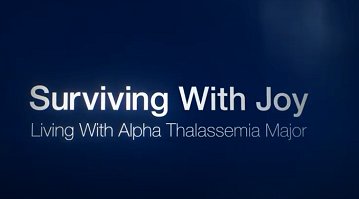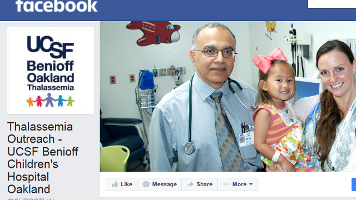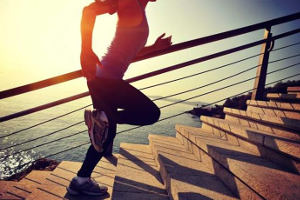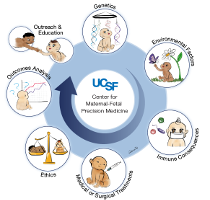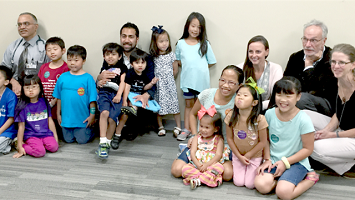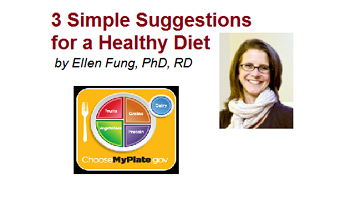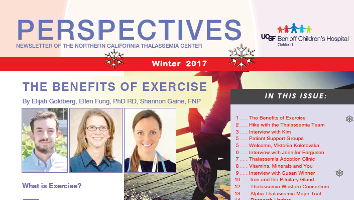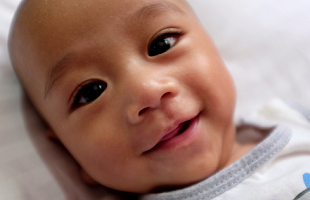Patient Stories
My Experience with Gene Therapy:
Imsub Monmeesin, interview by Mint Bhetraratana (April 2015)

Imsub's mother, Imsub, Cyrus Bascom and Marci Moriarty from the BMT team
Imsub Monmeesin is a 22-year-old student from Thailand. She has beta-thalassemia and recently concluded her participation in Bluebird Bio’s Northstar Study at UCSF Benioff Children’s Hospital Oakland. This experimental gene therapy involves inserting a functional human Βeta-globin gene in the patient’s stem cells ex vivo --meaning that the cells are altered outside the human body -- and then reinserting these modified stem cells into the patient’s bloodstream. This process is also known as autologous stem cell transplantation (www.bluebirdbio.com). I was able to sit down with Imsub -- or “Ae,” as she is known to her friends -- to talk to her about her journey. The following is an excerpt from an interview translated from Thai.
MB: Hi, Ae, let’s start with the basics. How would you describe your home? IM: I have a one-story home. I have a big family and I live in the country where we raise pigs.
MB: What do you study in Thailand, and what are your career goals? IM: I am in my second year studying pharmacy at Srinakharinwirot University. When I finish school, I would like to become a pharmacist. But I would also like to own my own café and sell pastries.
MB:How old were you when you were diagnosed with beta-thalassemia? IM: I was diagnosed with thalassemia at two years old, because I was sick for a long time. I went to the doctor and was treated at the Ramathibodi Hospital from then until now. Also, my sister was tested for the disease, and we found out she also has thalassemia. We both were treated.
MB: What was one of the challenges you faced growing up with beta-thalassemia? IM: Oh, well, I don’t remember much from when I was a child, but what I do remember is that I had to see the doctor every month to get blood transfusions and take my medications.

Imsub and Mint Bhetraratana
MB: Can you describe what your treatment is like in Thailand?
IM: In addition to getting blood transfusions and medications, I also have to get lab work done as the doctor orders. For instance, I have to get MRIs and other tests done that the doctor recommends to check my overall health. When I was younger, we looked into the possibility of getting matched for a bone marrow transplant. There was no match in my community, so we sent my blood work to Taiwan, but there was still no match.
MB: Do you know a lot of people who have thalassemia in Thailand? IM: I do not know of anyone else close who has thalassemia [other than my sister], but I became friends with the other thalassemia patients I met at the hospital.
MB: Why did you want to participate in the Bluebird Bio Northstar study? Was it a hard decision to make? IM: In the beginning, it was hard. At first, I didn’t want to [participate in the study], because I didn’t want to miss school and fall behind in my studies. At that time, there wasn’t a lot of information [about the study], because it was new, so I wasn’t sure if it would be safe or what to expect. It was a hard decision. But my parents wanted me to do it, and after speaking to a lot of doctors and getting more information about this therapy, I decided to do it, because we thought this could be a possible cure.
MB: Had you been to the United States before? When did you first arrive and who did you come with? IM: This is the first time I have been to the United States. I came to the States in April 2014; this is also my first time outside of Thailand! I came with my mother. When I arrived in the United States, I thought my English wasn’t that good, but I wanted to visit this country.
MB: What other places did you visit in the country? IM: I went to San Francisco and visited Pier 39. [She also visited Oakland, Los Angeles, and Arizona.]
MB: What was your favorite place? IM: [Imsub turns to ask her mom this question.] My mom liked many places! I liked San Francisco and L.A. the most.
MB: Can you explain the timeline of the gene therapy process? IM: For the first two weeks, I had to get a physical exams and other medical tests. Then my stem cells were collected over four days. My stem cells were then sent to the lab, which took about five to six weeks. Then they had to collect my stem cells for a second time, so it took longer than expected. After my stem cells were modified, I had to stay in the hospital for 40 days to get them transplanted. Overall, I will have stayed in the United States for almost nine months. [She went back to Thailand at the end of December.] I thought it would only take five to six months.
MB: Overall, was the gene therapy what you expected? IM: Yes, it was what I was hoping for. All of my lab work is okay now. I’m not sure what to expect in the long run, but I believe I will get better.
MB: Were there any challenges with the gene therapy? IM: I am uncertain because this was an experimental treatment, and the results are not yet known.
MB: What does completing gene therapy mean to you? IM: I hope to be cured of thalassemia, which means that I wouldn’t have to get monthly transfusions or take medications. If this treatment is successful, I will be cured, and others will be, as well!
MB: Are you cured of beta thalassemia? What are your next steps? IM: At this point, I am not 100 percent sure that I am cured because it has only been two months since the end of the treatment. I will need continuous followup. Having needed blood transfusions every month -- to now not need them for these past two months, I feel like it’s so far so good. When I go back to Thailand, I will have to get a monthly checkup, and see if everything is okay.
MB: Is there anyone that you’d like to thank who’s helped you on your thalassemia journey? IM: I would like to thank everyone! I would like to thank all of the bone marrow transplant team, the thalassemia team, the doctors, and all of the staff who helped me at the hospital. I would like to thank Dr. Lal, Dr. Vichinsky, and Mint, too. [All laugh.] I would also like to thank my Thai interpreters, Joy and Benjawan.
MB: Please finish this sentence. One thing that I want people to know about me is ... IM: Wow, that’s a hard question. I think...even though I have thalassemia, I will not give up; I will keep on fighting.
MB: How about this? One thing that I want people to know about thalassemia is... IM: Some people may see thalassemia as a hardship, but I think it helps me know how to take better care of myself. I hope in the future, [this therapy] will provide a cure, and that everyone will take care of themselves and be well in their treatment. My mom also says that before you decide to have a family, you should get tested to see if your child will have thalassemia.
MB: What is the first thing that you will do when you go back to Thailand? IM: I will hug my dad!
MB: Will you come back to visit the United States? IM: I will definitely come back to visit the United States, but not for treatment -- for vacation, because there are many places I want to see!
MB: Thank you for your time, Ae. IM: Thank you.
Mint Bhetraratana has been a Thalassemia Outreach intern since June 2013 after graduating from U.C. Berkeley with a B.A. in Public Health and Integrative Biology. She also works as an advocate coordinator with Health Leads and as a medical and dental assistant with a local nonprofit called Kerry’s Kids. Mint has enjoyed getting to know Ae over this past year and loves educating the community on thalassemia at health fairs and blood drives.

